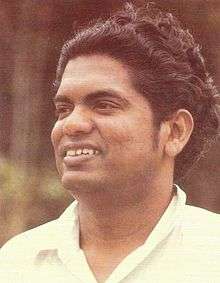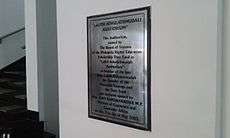Lalith Athulathmudali
| The Honourable Lalith Athulathmudali PC, MP | |
|---|---|
 | |
| Minister of Education, National Security, Trade and Agriculture | |
| Member of the Sri Lankan Parliament for Colombo | |
|
In office 15 February 1989 – 23 April 1993 | |
| Personal details | |
| Born |
26 November 1936 Colombo, Ceylon |
| Died |
23 April 1993 (aged 56) Colombo, Sri Lanka |
| Nationality | Sri Lankan |
| Political party | United National Party |
| Other political affiliations | Democratic United National Front |
| Spouse(s) | Srimani Anoma Athulathmudali |
| Children | Serela Athulathmudali |
| Alma mater |
Harvard University Jesus College, Oxford Royal College, Colombo St. John's College Panadura |
| Occupation | Politician |
| Profession | Barrister, University lecturer |
| Religion | Theravada Buddhism |
Lalith William Samarasekera Athulathmudali (Sinhala:ලලිත් ඇතුලත්මුදලි; 26 November 1936 – 23 April 1993), known as Lalith Athulathmudali, was a prominent Sri Lankan politician of the United National Party and former Cabinet Minister of Trade, National Security, Agriculture, Education and deputy minister of defence.
Early life and teaching career
Born to a family of Lawyers, his father was a Member of the State Council of Ceylon. Athulathmudali was educated at St. John's College Panadura before moving to Royal College Colombo where he won the Steward Prize. He then went on to read Jurisprudence at Jesus College, University of Oxford from 1955, President of the Oxford Union in 1958 and won the Lord Sanky Prize. He was the first Sri Lankan to be elected as the President of the Oxford Union. After that he went to teach law as a lecturer at the University of Singapore, the Hebrew University in Israel, the University of Edinburgh and the University of Allahabad, and finally became a lecturer in Jurisprudence in the Ceylon Law College. In 1985 he was appointed a President's Counsel.
Political career
Lalith Athulathmudali was elected to Parliament in 1977 and went on to become the Deputy Minister of Defence, Minister of National Security and Minister of Trade under President J.R. Jayewardene during the 1980s. During this time, as Minister of Trade, he introduced Intellectual Property Law.[1] He started reforms in both the police and army. The most controversial of his measures was to call for Israeli assistance.[2] He organised several offensives against territories held by the LTTE including Vadamarachchi Operation. He was seriously injured in an attack inside the Parliament complex in 1987.The biggest debacle of his political career came in May 1988 when he declared a truce with the rebellion JVP.The main brokers of the socalled truce were a lawyer called Kelly Senanayake and Fr Thissa Balasooriya who later found had no mandate to represent JVP.He was embarresed and humiliated a lot however[3] upon Jayewardene's retirement in 1988, tried to obtain the UNP's nomination for the presidential election, but was defeated by Ranasinghe Premadasa who went on to win the presidency.
Premadasa demoted Athulathmudali to Minister of Agriculture, then Minister of Education. He also tried to have Athulathmudali removed from his UNP party positions. He was accused by Premadasa as being one of the cabinet ministers behind the Burning of Jaffna library in 1981. Athulathmudali became disenchanted with Premadasa's leadership.
Mervyn De Silva, Hon.Sirimavo Bandaranaike and Anuradha Dullewe Wijeyeratne
Athulathmudali and several UNP MPs brought forth a motion to impeach Premadasa. When that failed, he was expelled from the UNP, and began forming a new party, the Democratic United National Front. He announced his candidacy for the presidency, but was assassinated by a gunman on 23 April 1993 after an election rally. Initially, the government blamed the LTTE and produced the body of a Tamil youth named Ragunathan was found near the scene of the shooting the following day. He had apparently died from taking a cyanide capsule. However, these claims were later proved to be false.
A Presidential Commission carried out by the Sri Lankan Government concluded that Sri Lankan President Ranasinghe Premadasa was directly responsible for the assassination. It also concluded that the Tamil youth Ragunathan, was murdered by the same people who killed Athulathmudali, by forcibly administering him with cyanide.[4]
Legacy

Athulathmudali is considered as one of the most distinguished Sri Lankan statesmen in recent history. He is still remembered by many in Sri Lanka as a gentlemen and as one of the few well educated politicians of that era. In his honour a statue and memorial has been erected in Colombo. His contribution to the education of the country is eminence, the Mahapola Fund he established has greatly contributed to the development of higher education and provides scholarships for needy students annually. The Lalith Athulathmudali Auditorium at the Sri Lanka Institute of Information Technology and the Lalith Athulathmudali Memorial Prize which is one of the prestigious prizes awarded annually at Royal College, Colombo (his alma mater) (awarded for the Most Outstanding Royalist (Student of Royal College) of the Year) are named in his honour.
See also
- Assassination of Lalith Athulathmudali
- List of political families in Sri Lanka
- Notable assassinations of the Sri Lankan Civil War
- Sri Lankan Civil War
- Ranasinghe Premadasa
References
- ↑ Roberts, Adam (2012). Democracy, Sovereignty and Terror: Lakshman Kadirgamar on the Foundations of International Order. I.B.Tauris. p. 38. ISBN 9781848853072.
- ↑ United States. Foreign Broadcast Information Service, United States. Joint Publications Research Service (1985). "Near East/South Asia Report Page 177" (85128). Foreign Broadcast Information Service.
- ↑ A Politician of Great Skill.Dailymirror.6 May 2014.Available online
- ↑ SRI LANKA: THE UNTOLD STORY Chapter 58: Premadasa indicted
External links
- The Athulathmudali Ancestry
- Article for Lalith Athulathmudali on Sadaharita
- Official Website of United National Party
- Sri Lanka: the Untold Story
- Obituary at Liberal International
- Lalith Athulathmudali epitome of a pragmatic politician
- He shared his views but never interfered in military matters
- Athulathmudali memorial lecture by Anura Banadaranaike
- We must not give up resolve to fight the LTTE’
- Time to revisit Athulathmudali approach
- Trailblazer of recent times
- Lalith Athulathmudali in Sinhala
- Lalith Athulathmudali in Sinhala